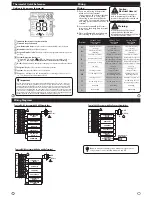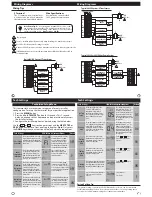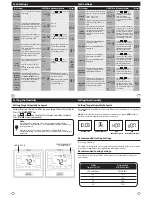
Thermostat Quick Reference
The low battery indicator is displayed when the AA battery power is low. If the user
fails to replace the battery within 21 days, the screen will only show the low battery
indicator but maintain all functionality. If the user fails to replace the batteries after
an additional 21 days (days 22-42 since first “low battery” display) the setpoints will
change to 55˚F (Heating) and 85˚F (Cooling). If the user adjusts the setpoint away from
either of these, it will hold for 4 hours then return to either 55˚F or 85˚F. After day 63
the batteries must be replaced immediately to avoid freezing or overheating because
the thermostat will shut the unit off until the batteries are changed.
Important
Indicates the current room temperature
Time and day of the week
Setpoint:
Displays the selected setpoint temperature.
Hold
is displayed when the thermostat program is permanently overridden.
System Operation Indicators:
The COOL ON , HEAT ON or icon will display when the COOL, HEAT, or
(fan) is on.
The compressor delay feature is active if these are flashing.
1
2
3
7
8
Low Battery Indicator:
Replace batteries when this indicator is shown.
Menu Options:
Shows different options.
Program Time Periods:
This thermostat has 4 programmable time periods
per day.
7
2
1
8
Getting to know your thermostat
Wiring
Caution:
Electrical Hazard
All components of the control
system and the thermostat
installation must conform to Class II
circuits per the NEC Code.
Warning:
Wiring
If you are replacing a thermostat,
make note of the terminal
connections on the thermostat that
is being replaced. In some cases
the wiring connections will not be
color coded. For example, the green
wire may not be connected to the
G
terminal.
Loosen the terminal block screws.
Insert wires then retighten terminal
block screws.
Place nonflammable insulation into
wall opening to prevent drafts.
1.
2.
3.
Failure to disconnect the power
before beginning to install this
product can cause electrical shock
or equipment damage.
Typical 2H/2C system with 24 VAC Humidifier
3
Typical 2H/2C system with Dehumidify Terminal
System:
Indicates current mode of operation.
Terminal
2 Heat 2 Cool
Conventional
System
2 Heat 2 Cool
Heat Pump
System
3 Heat 2 Cool
Heat Pump
System
RC
RH
C
B
O
G
W/E
W2
Transformer power
(cooling)
Transformer power
(heating)
Transformer common
Energized in heating
Energized in cooling
Fan relay
First stage of heat
Second stage of heat
Transformer power
(cooling)
Transformer power
(heating)
Transformer common
Heat pump changeover
valve energized in heating
Fan relay
First stage of
emergency heat
Auxiliary heat relay,
second stage of heat
Heat pump changeover
valve energized in cooling
Transformer power
(cooling)
Transformer power
(heating)
Transformer common
Heat pump changeover
valve energized in heating
Fan relay
First stage of
emergency heat
Auxiliary heat relay,
third stage of heat
Heat pump changeover
valve energized in cooling
Wiring Diagrams
Stages:
+1 will appear in the display when second stage of heat or cool is
on. +2 will appear for third stage of heat.
Y
Y2
First stage of cool
Second stage of cool
First stage of heat & cool
Second stage of cool
First stage of heat & cool
Second stage of cool
& second stage of heat
H
Humidify
Humidify
D
Dehumidify
Dehumidify
Humidify
Dehumidify
L2
L1
(HOT)
C
R
RC
RH
Y
C
G
W/E
W2
Y2
H
COMPRESSOR
RELAY
HUMIDIFIER
HEAT RELAY
FAN RELAY
HEAT RELAY 2
COMPRESSOR
RELAY 2
RC
RH
Y
C
W/E
G
W2
Y2
D
COMPRESSOR
RELAY
HEAT RELAY
FAN RELAY
HEAT RELAY 2
COMPRESSOR
RELAY 2
DEHUMIDIFIER
RELAY
L2
L1
(HOT)
C
R
Typical 2H/2C system with Dry Contact Humidifier
RC
RH
Y
C
W/E
G
W2
Y2
H
COMPRESSOR
RELAY
24V RELAY
NORMALLY-OPEN
TERMINALS
HEAT RELAY
FAN RELAY
HEAT RELAY 2
COMPRESSOR
RELAY 2
L2
L1
(HOT)
C
R
DRY CONTACT
HUMIDIFIER
HUM
HUM
Note:
In many heat pump systems with no emergency heat
relay a jumper can be installed between E and W2.
























